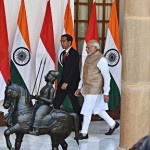A mix of reasons – history, the ideology of tolerance, and their strategic location in Asia – has made India and Indonesia vital to each other even though they may not have the closest possible relations today. Since 2014, the Modi and Jokowi governments have taken their time to connect with each other at the highest political level, thus losing early opportunities to create a new momentum in bilateral relations.
Prime Minister Modi chose not to participate in the 60th anniversary celebrations of the Bandung Conference of Asian and African leaders, hosted by the Indonesian government in April 2015. He will again miss an opportunity to visit Indonesia as, instead of him, Vice President M. Hamid Ansari will represent India at the first ever summit of the Indian Ocean Rim Association (IORA) on March 7. This will be the Vice President’s second visit to Indonesia in 16 months.
However, it should be recalled that a high point in bilateral ties was reached when the Indian government played host to President Joko Widodo (popularly known as Jokowi) during his state visit in December 2016. This was an Indonesian president’s visit to India after a gap of five years. Jokowi’s visit may not have created a big media splash, but it resulted in significant gains. The long-term impact of these gains will become visible once Jakarta and New Delhi begin to address the tasks they have set for themselves.
The joint statement, issued at the conclusion of the Indonesian president’s visit, lists out five major goals to be achieved in the first half of 2017. These include meetings of the Joint Commission, Defence Ministers Dialogue and Joint Defence Cooperation Committee, Biennial Trade Ministers Forum, Energy Forum (to develop a roadmap for energy cooperation) and the launch of a Security Dialogue (to craft a comprehensive plan on security cooperation). All these mechanisms assume importance because the two governments issued a separate statement on “Maritime Cooperation”. Its basic element – the two governments’ commitment to “maintaining maritime legal order” based on principles of international law – has surely been noted in all East Asian capitals. Now is the time for matching those declarations with suitable action.
In this context, Delhi and Jakarta stand to benefit considerably from the creative and forward-looking report, presented by the 10-member Eminent Persons’ Group (EPG) during the Jokowi visit. The previous leaders, President Yudhoyono and Prime Minister Manmohan Singh, had proposed the EPG’s formation, but the present ones did the actual implementation last year. The EPG has crafted a visionary, yet practical, roadmap for bilateral relations. It is convinced that, caught in the midst of “global power shifts”, India and Indonesia will secure their national interests only through a sustainable long-term strategic partnership. Its prescriptions are based on the “considerable compatibility” between India’s Act East Policy and the New Indian Ocean Policy, and Indonesia’s Maritime Fulcrum Policy.
The EPG’s observation is that the optimal potential of the India-Indonesia relationship has been left untapped. Its fundamental advice to the two governments is to elevate the existing partnership to a “New Comprehensive Strategic Partnership” that will help broaden relations in all three vital segments, namely government-to-government, business-to-business and people-to-people exchanges.
Its recommendations cover five major areas, namely strategic engagement, defence and security cooperation, comprehensive economic partnership, cultural and people-to-people links, and cooperation in responding to common challenges. It attaches premium to high-level engagement, especially annual meetings of the top leaders, either at bilateral summits or on the sidelines of major multilateral meetings.
Reading between the lines, it seems that the onus is now on New Delhi to arrange an early visit by PM Modi to Indonesia. A bilateral Track 1.5 dialogue on IORA-related matters, particularly on the Blue Economy and its development potential, may be very useful.
Further, an important suggestion is to launch a series of Track 1.5 or Track II trilateral dialogues involving India and Indonesia as well as a third country. Four countries have been specifically identified for this purpose: U.S., Japan, Australia and the Republic of Korea.
There was both a convergence and divergence of views on defence and security cooperation. “The Indian members” of the EPG noted that China’s Maritime Silk Route and One Belt, One Road Initiative were designed “as strategic projects to expand China’s influence”. But some “members of the EPG” from both countries noted that Indonesia too had been affected by China’s maritime incursions into Indonesian waters off the Nathuna Islands.
The EPG has recommended a series of well-thought out measures to deepen defence cooperation and make the economic partnership too more meaningful and productive. An ambitious, but achievable, target of 50:50 (i.e. bilateral trade amounting to $50 billion and two-way investment of $50 billion) by 2025 has been proposed. For it to become reality, both governments and the private sector need to develop special synergies and suitable action plans.
With EPG members being drawn from non-governmental sectors, they have laid emphasis, as expected, on closer cooperation at the people’s level. An interesting recommendation relates to instituting a dialogue between scholars and representatives of civil society, one that ought to focus on “Unity in Diversity”, a philosophy adopted by both nations.
The ball is now in the court of the two governments. They can render yeoman service to the bilateral relationship and the region by ensuring sustained follow-up action on their agreements, declared intentions and the EPG report.
Rajiv Bhatia is Distinguished Fellow, Foreign Policy Studies Programme, Gateway House, and a former ambassador. He served as a member of the India-Indonesia Eminent Persons’ Group (IIEPG) in 2016.
This article was exclusively written for Gateway House: Indian Council on Global Relations. You can read more exclusive content here.
For interview requests with the author, or for permission to republish, please contact outreach@gatewayhouse.in.
© Copyright 2017 Gateway House: Indian Council on Global Relations. All rights reserved. Any unauthorized copying or reproduction is strictly prohibited


